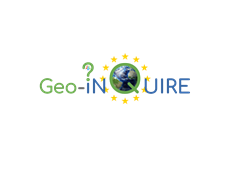Geo-INQUIRE project integrates a vast number of different data types and products through services already available to the geoscience community in Europe and provided by the participating research infrastructures. Many of these are already freely available and operational.
The scientific goals of Geo-INQUIRE are summarized by the following six priorities:
- Consolidate and enhance the access to multidisciplinary and interoperable datasets: towards higher spatial and temporal resolutions that will allow previously infeasible curiosity-driven research
- Enhanced access to new and innovative observables and products
- Opening new research opportunities to allow the enhanced understanding of the interface between the solid earth and its fluid envelope
- From single hazard to multi-risk: supporting cross-disciplinary and integrated studies of extreme geohazards
- Game-changing research possibilities in georesource management by the provision of innovative data, products, and services
- Provision of innovative data-management, simulation, and visualisation techniques at the interface with HPC facilities
Funded by: EU HORIZON Europe
52 partners in Europe
Project duration: 2022/2026
More info: https://www.geo-inquire.eu/


